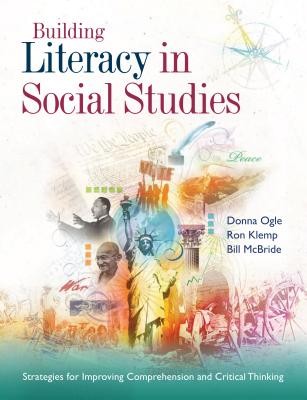
- We will send in 10–14 business days.
- Author: Donna Ogle
- Publisher: ASCD
- ISBN-10: 1416605584
- ISBN-13: 9781416605584
- Format: 21.6 x 27.7 x 1.3 cm, minkšti viršeliai
- Language: English
- SAVE -10% with code: EXTRA
Reviews
Description
Preparing students to be active, informed, literate citizens is one of the primary functions of public schools. But how can students become engaged citizens if they can't read, let alone understand, their social studies texts? What can educators--and social studies teachers in particular--do to help students develop the knowledge, skills, and motivation to become engaged in civic life?
Building Literacy in Social Studies addresses this question by presenting both the underlying concepts and the research-based techniques that teachers can use to engage students and build the skills they need to become successful readers, critical thinkers, and active citizens. The authors provide targeted strategies--including teaching models, graphic organizers, and step-by-step instructions--for activities such as
* Building vocabulary,
* Developing textbook literacy skills,
* Interpreting primary and secondary sources,
* Applying critical thinking skills to newspapers and magazines, and
* Evaluating Internet sources.
Readers will also learn how to organize classrooms into models of democracy by creating learning communities that support literacy instruction, distribute authority, encourage cooperation, and increase accountability among students. Realistic scenarios depict a typical social studies teacher's experience before and after implementing the strategies in the classroom, showing their potential to make a significant difference in how students respond to instruction. By making literacy strategies a vital part of content-area instruction, teachers not only help students better understand their schoolwork but also open students' eyes to the power that informed and engaged people have to change the world.
EXTRA 10 % discount with code: EXTRA
The promotion ends in 21d.19:47:33
The discount code is valid when purchasing from 10 €. Discounts do not stack.
- Author: Donna Ogle
- Publisher: ASCD
- ISBN-10: 1416605584
- ISBN-13: 9781416605584
- Format: 21.6 x 27.7 x 1.3 cm, minkšti viršeliai
- Language: English English
Preparing students to be active, informed, literate citizens is one of the primary functions of public schools. But how can students become engaged citizens if they can't read, let alone understand, their social studies texts? What can educators--and social studies teachers in particular--do to help students develop the knowledge, skills, and motivation to become engaged in civic life?
Building Literacy in Social Studies addresses this question by presenting both the underlying concepts and the research-based techniques that teachers can use to engage students and build the skills they need to become successful readers, critical thinkers, and active citizens. The authors provide targeted strategies--including teaching models, graphic organizers, and step-by-step instructions--for activities such as
* Building vocabulary,
* Developing textbook literacy skills,
* Interpreting primary and secondary sources,
* Applying critical thinking skills to newspapers and magazines, and
* Evaluating Internet sources.
Readers will also learn how to organize classrooms into models of democracy by creating learning communities that support literacy instruction, distribute authority, encourage cooperation, and increase accountability among students. Realistic scenarios depict a typical social studies teacher's experience before and after implementing the strategies in the classroom, showing their potential to make a significant difference in how students respond to instruction. By making literacy strategies a vital part of content-area instruction, teachers not only help students better understand their schoolwork but also open students' eyes to the power that informed and engaged people have to change the world.


Reviews